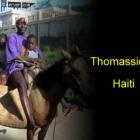ADVERTISEMENT
Health
The Health Category addresses all issues related to Health care in Haiti, starting with the availability of medical services for the Haitian population, where people can find health care in Haiti and also how to improve the system
Tips for travelers against mosquito transmitted chikungunya virus
The mosquito-borne virus chikungunya has been spreading across the Caribbean and no is immune from it. It is not fatal but causes severe joint pain.
So far, Haiti has been the Caribbean country with the most recent confirmed outbreak of chikungunya. The Dominican Republic, Puerto Rico and several other Caribbean islands have seen an increase in the chikungunya virus as well.
So the question is: How do you protect yourself from the spread of the chikungunya virus? If I live in Haiti or just visiting, how do I make sure I don't end up with the virus?
Disabled Haitians receiving more Acceptance at Public Events
Haiti is catching up with the rest of the world in giving attention to the needs and rights of disabled persons. At 2014 Carnival, 40 disabled people participated in the parade. The first contingent in the parade, right behind the National Palace band, they were the center of attention, wearing t-shirts emblazoned with slogans, meant to trumpet their equality and inclusiveness among all citizens of Haiti.
The achievement of being able to march in one of Haiti's most well-attended events of the year was due to Gerald Oriol Jr., Secretary of State for the State Office for the Integration of Persons with Disabilities. Oriol himself is disabled, afflicted with muscular dystrophy since birth and consigned to a wheelchair as a young boy. Oriol says no official count of how many people in Haiti are living with disabilities has been done, but rough estimates put the figure at 800,000-1,000,000.
Unicef working to eliminate maternal and newborn tetanus in Haiti
Ministry of Public Health and Population's Campaign to Eliminate Tetanus
Ministry of Public Health and Population (MPHP), with the support of UNICEF, has a goal of stamping out maternal and neonatal tetanus in Haiti within two years. Tetanus is a deadly disease that leads to death for many newborns. This year's campaign is aimed at 65 communes with a high-risk potential. Among the at-risk communes is Milford in the South-East Department. A statistic reveals almost 50% of tetanus cases happen in Haiti across the Caribbean region.
The problem with getting communes in the South-East Department vaccinated is they are remote. One of the communes, Milford, is difficult to access because the road leading to Milford from Jacmel hugs the side of a mountain, a three-hour drive and six-hour walk. Those on foot labor under brutal climatic conditions, a broiling sun and continuous high winds. Vaccinators endure these elements because women will not undertake the journey to come and get vaccinated.
Gustavo Gallon called for "full compensation" for cholera Victims
UN Claims Immunity from Victims' Lawsuit in Cholera Action
Mr. Gustavo Gallon, a human rights expert, who was appointed by the UN, has exposed the international agency for its negligence in accepting responsibility for the 2010 cholera outbreak in Haiti. He has released a report that claims a UN peacekeeping force, based in Central Haiti, let sewage leak into a river close to the base. The sewage pipes were not properly maintained and caused sewage to seep into the river.
The UN disclaims responsibility against evidence found during an investigation. Its defense is two-fold: one, it is not possible to locate the actual source where the cholera bacteria developed, and two, even if it was responsible, it is protected by the Convention on the Privileges and Immunities of the UN.
First Lady Dedicated to Social Advocacy for Mental Health Issues
First Lady Sophia Martelly's advocacy for the poor began at the age of 18. It was on Christmas Day she volunteered to deliver dinners to the hungry. It was this shared compassion for Haiti's poor that brought her and husband, President Martelly, together. Since gaining the spotlight, the Martelly's have built a reputation for becoming involved in programs and causes pertaining to the neediest on the island.
The First Lady has her own office out of which she operates at the National Palace. She is a natural in her role as social advocate, overseeing projects and heading committees for many charitable causes.
Ravine Pintade, Haiti
"Katye Project" is a rehabilitation project in the neighborhood of Ravine Pintade in Port-au-Prince. The neighborhood was severely damaged in the earthquake of 2010. The U.S government in association with CHF International and Project Concern International (PCI), a representative of the Haitian government, has completed the $8.5 million rehabilitation project. CHF is a non-profit international organization which was originally founded in 1952 as Cooperative Housing Foundation but changed its name to Global Communities. "Katye Project" is a good example on successful use of international fund on a collaborative neighborhood reconstruction project. The project was appropriately named "Katye"--which means 'neighborhood' in Creole. The completion of the project marked a new beginning for the victims of Ravine Pintade.
The Mighty Onion Flavorful and Nutritious Addition to Diet
The onion, in all its shapes and varieties, not only provides a succulent addition to hot recipes and crunchiness to raw salads, but also promotes many health benefits.
The onion is classified as a botanical vegetable, part of the genus alliaceae, also called allium cepa. The plant grows approximately two feet in height, and takes three to our months before it can be harvested. It is a popular vegetable used in cooking all over the globe.
Yellow and white onions possess a pungency because of a sulfur compound, allyl propyl disulphide. The Spanish red variety are milder and sweeter, a perfect accompaniment to salads. The shallot, a small, mild-tasting onion, possesses an ovular shape and sweeter flavor.
Drinking Hot Water & Lemon in the Morning
Lemon, the ellipsoidal, often yellow fruit that is almost a staple in Haitian homes is used in everything from the preparation of cool, refreshing glasses of lemonade, to the preparation of food. A great ingredient, the citrus fruit gives flavor in its juice and its rind (zest). A new way of using lemons, that is quickly catching-on, pushes its importance even further.
According to American nutritionist Ann Louise Gittleman, lemons can also be the answer to the question of how one can obtain optimal hydration, improve digestion, boost immunity and, the holy grail of all health goals, lose weight.
Just by swapping out your tea or coffee in the morning for a hot cup of lemon water, people can see the benefits of this super fruit through many aspects of health. To make the drink, to be had first thing in the morning for best results, one should combine the juice of half of one lemon, or 1 tablespoon of 100% organic lemon juice for those who do not have fresh lemons, with a cup of hot water. Drinking this concoction, which can be spruced up to taste with anything from ground cinnamon or ginger--a pinch of each, will give further drive to one's metabolism.
Mental Health Services in Haiti
The majority of the Haitians live in psychological fragile state. They have been dealing with elevated chronic life stress for many years where the basics of daily life do not come easily.
The everyday lives of common Haitians pass in abject poverty which takes toll on their nature and psychological functioning. As per recent U.N report, 55% of the population lives with less than $1.25 per day and 58% of them are undernourished. The massive earthquake of 2010 has cracked in the psychic structures for those vulnerable to mental illness and aggravated the suffering of many others with invisible wounds. It has taken away the ability to function effectively as possible.
Nursing education in Haiti increased from 3 years to 4 years
Almost exactly three years ago, one year after their necessary role in Haitian society was made glaringly clear to those in need of and lacking aid after the 2010 earthquake, the focus on the country's small fleet of nurses grew and the newfound interest allowed for the creation of a brand new program for nursing in the country. The need arose after the quake took the lives of near to a hundred nurses in the country and also brought down the Port-au-Prince school for nursing.
In 2011, the new plan to revive the field came in the shape of a master's degree program, requiring three years of study, was made available to nursing school students from five of the public schools for nursing across the country. Included in the three years of study, students followed decades' held curriculum studying mainly for hospital service. This left a gap in the market for other fields such as patient education, pediatric care, public health program management, surgery and primary care.
Our objective is to share with you news and information about Haiti and the people of Haiti. Traditions, habits and the way we were or grew are alive in this site. We highly recommend that you Subscribe to our Newsletter and also share with us some of the things that are memorable and made us unique people.

 Something to think about
Something to think about  Informative Marketing and Advertising in the Haitian Community
Informative Marketing and Advertising in the Haitian Community  Black Friday Shopping Season
Black Friday Shopping Season  Thomassique, Haiti
Thomassique, Haiti  Battle of Vertieres
Battle of Vertieres